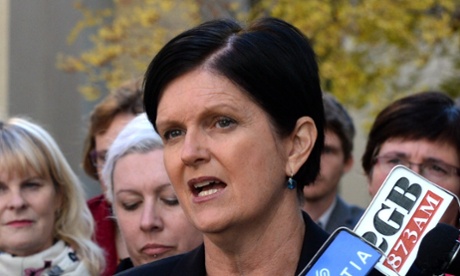Budget changes mean pensions will be $80 a week less within a decade: Acoss
Advocacy group says low- and middle-income families will be hardest hit by spending cuts and tax increases

Pensions will be reduced by about $80 a week within a decade because
of changes to indexation in the federal budget, analysis by the
Australian Council of Social Service (Acoss) shows.
The
advocacy group is part of a growing chorus criticising the budget for
focusing too much on spending cuts and not enough on tax increases which
they say has led to a far larger burden on low- and middle-income
earners.
Acoss analysis shows $19.2bn of the $37.2bn in budget
savings over the next four years will mainly affect low- and
middle-income families and $5.7bn are tax increases or savings in
programs which affect the rich.
The report, A Budget that Divides a Nation,
says pensioners on aged and disability support payments would lose
about $80 a week by 2024 after having their payments indexed to CPI.
Aged pension and DSP growth is linked to inflation, the pensioner living cost index and the average weekly male earnings; the budget outlined changes which will instead see them linked to inflation, which has been a lower rate than wages growth for the past few years.
It
is not possible to work out the exact impact on pensions over the long
term but, working on current economic forecasts, Acoss concluded the
pensions would shrink by $160 a fortnight.
The report also warned the budget would accelerate the trend of the rich getting richer and the poor getting poorer. It said changing unemployment benefits for people under 30 “fundamentally changes the Australian income support safety net”.
“Traditionally,
Australia has a safety net for all who need it and requires
participation in return. The budget turns this around by excluding an
entire group of people from basic assistance with exemption only for
select categories of people,” the report said.
The analysis comes as Jobs Australia estimates 100,000 trainee places would have to be created by next July for jobless people under 30 to take up the government’s “earn or learn” pledge so they can get payments.
“Rather
than bringing us together in a truly fair, shared effort, this budget
entrenches division in our community: between young and old, and people
on high incomes and those struggling to make ends meet,” Acoss’s chief,
Cassandra Goldie, said in the foreword of the report.
“It
threatens to destroy the social safety net that has served our nation
well – with severe cuts to to essential areas such as health, disability
support, income support, community services and housing programs. The
budget will damage far more than it repairs.”
The treasurer, Joe
Hockey, defended the budget when he addressed an Acoss lunch on
Wednesday and said it was not about making people happy.
He said
if productivity did not improve, quality of life would deteriorate and
the most vulnerable people would be the ones most affected.
“Unquestionably,
there has been an expansion of the welfare system over the years and I
gave a speech on the end of the age of entitlement two years ago and it
was simply about making the point. The politicians have been as guilty
as everyone else in extending what is deemed to be welfare, higher and
higher up the pay scale, and what it means is you can do it and you can
afford it while you've got money coming in but then when the money
doesn't come in, how do you pare it back?” he said.
“And what we
really want to see is a strong safety net in Australia, an entirely
sustainable safety net in Australia, and the balancing act is trying to
reduce the spread of welfare but at the same time ensure that the
welfare safety net is strong.
“And also, importantly, to make
sure that there is appropriate support for those that are helping to
provide services to those most vulnerable in the community outside of
the government and that's a lot of what you do.”
The prime
minister, Tony Abbott, also defended the budget against suggestions that
the poor were harder hit than the rich, saying everyone has to shoulder
some pain.
While interviewing Abbott on the 3AW radio station on
Wednesday, Neil Mitchell said the deficit levy would not hurt
high-income earners as much as people being forced to go six months
without income support under changes to the dole.
“Well I don’t
want to ask you what you’re paid, Neil, but if you’re earning a half a
million dollars and that’s what the prime minister gets paid the tax
bill goes up about $6500 a year for the next three years,” Abbott
replied.
“There’ll be a freeze on MPs’ pay and senior public
servants’ and judges’ pay for 12 months and, of course, everyone will
pay the fuel excise indexation. The average family will pay about 40
cents a week more in the first year as a result of that.”
When
Mitchell responded Abbott would not miss $6,000 a year from his pay
packet the prime minister replied: “Look, I’m not complaining, Neil –
I’m not complaining. I’m saying that everyone is going to do his or her
bit so that all of us will be better off in the long run.”

No comments:
Post a Comment